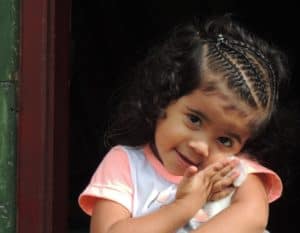Every ten years, the U.S. Census Bureau conducts a nationwide census to collect important data about people living in the United States. The Census is mandated by the U.S. Constitution (Article 1, Section 2) in order to determine the number of seats each state has in the U.S. House of Representatives, and to guide the distribution of federal funds to communities around the country. More than $16 billion to our state depends on an accurate count, but there are many groups of people who are often missed.
A new report from NC Child and NALEO Educational Fund, “The Statewide Implications of Undercounting Latino Children,” explores one of the groups most often missed in the Census count: young Latino children – and makes recommendations to fix the problem.
Young Latino children are especially likely to be undercounted in the Census. According to the U.S. Census Bureau, this is due to the fact that Latino youth are over-represented in the hard-to-count populations, including:
- Children under age five,
- Racial and ethnic minorities,
- Linguistic minorities,
- Low-income families, and
- Migrant families.
So what does this mean for the upcoming Census, and for North Carolina’s kids? Census 2020 will be our chance to accurately measure the state’s population growth, but we have to be proactive to ensure we get the count right.
There are several new challenges that could affect the 2020 Census data collection. The upcoming census will be hosted primarily online, which will pose a challenge for people with limited internet access. Moreover, the current administration has cut funding and staff at the Census Bureau. This has resulted in fewer statewide Census tests being run. It will also mean fewer local Census coordinators who can help hard-to-count families understand the census form.
Another significant change impacting Latino families is the potential addition of a question on citizenship to the 2020 Census (this fate of this question is currently being argued in the courts). The purpose of the Census is to count all U.S. residents — regardless of their citizenship status. Adding a question about citizenship will almost certainly cause families with immigrants in the household to avoid the census, or fill out their forms incompletely (read our recent blog on the citizenship question). Skewed census data will likely result in yet another significant undercount.
Within the past few years, the Latino population in North Carolina has increased substantially ― 16.5 percent from 2010 to 2016. Unfortunately, while North Carolina’s young Latino population has grown over time, the count of young children in the Census has worsened, for several reasons. Children under age five are more likely than older children to live in hard-to-count areas with high poverty and complex, multi-unit housing. In 2017, Latino children under five were three times more likely than white children to live in poverty. According to the Census Bureau, they are also more likely than other children to live in homes with three or more generations of a single family, or more than one family in a single household. All of these factors contribute to making young Latino children one of the hardest populations to count accurately in the Census.
We can all start working now to increase awareness of Census 2020, with special focus on the families of North Carolina’s Latino children under five. If you work with families of young children, make sure you’re communicating how important it is to count every household member on the census form in 2020. You can get resources to help at Census.NC.gov. Ensuring that our state’s hardest-to-count population — young Latino children — is accurately included in the upcoming census will strengthen democracy and protect critical resources for North Carolina. The next decade of opportunity for children depends on our success.
Fumi Agboola is NC Child’s Policy Research Intern. She is a BA candidate (2019) at NC State University studying Education, Nonprofit Studies, and Business Entrepreneurship.

